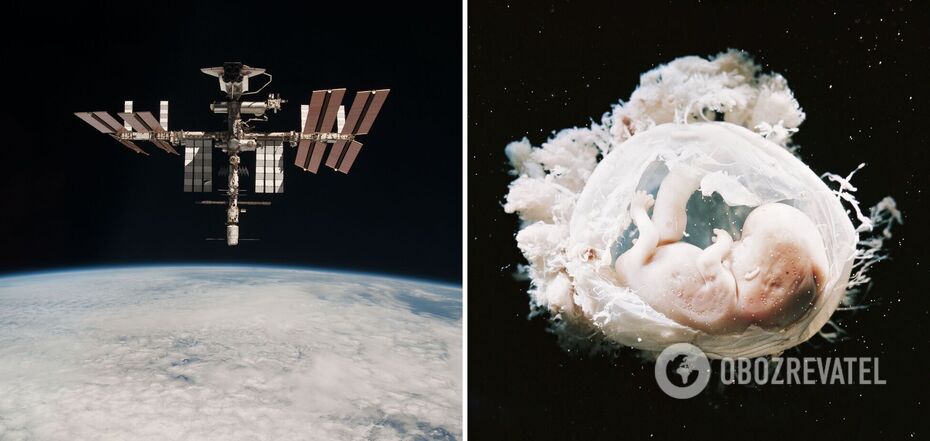News
Humanity aspires to live on the Moon and Mars but has zero knowledge of pregnancy in space: details on the experiments
For at least the last decade, the issue of human settlement in space - on the Moon or distant Mars - has been discussed so lively as if humanity were already fully prepared for this and had all the necessary knowledge. However, the reality is that there have been fewer than 700 people in space, and most of them are white men with military backgrounds who have been selected for their health and skills. Meanwhile, it is unclear how humanity plans to turn into an interplanetary species when knowledge about how pregnancy goes in zero gravity is actually zero.
According to Popular Science, this question is becoming very relevant given the rapidly changing demographics of astronauts and the growing number of private companies that send space tourists on suborbital and orbital flights.
As more people go into space, there is the potential for all sorts of medical scenarios to arise: from heart attacks and traumatic injuries to one of the most human things of all: pregnancy.
"It's not a question of if it's going to happen, it's a question of when," said Emmanuel Urquieta, chief medical officer of the Translational Research Institute for Space Health (TRISH) at Baylor College of Medicine.
He explained that a small sample of people who have been in space provides very little knowledge about how the average body reacts to long-duration flights. If we talk about more intimate things like conception, pregnancy, and childbirth, there is no data at all on how this happens in the human body in space. However, it is obvious that low gravity, high levels of radiation, and other space factors pose risks to the healthy development of the fetus or the birth of a child.
"If we plan to develop opportunities for settling and creating extraterrestrial colonies on the Moon and Mars, this is something that must be addressed," Urquieta said.
Scientists now have at least some data on pregnancy in space thanks to experiments conducted on mice. The results of one such study were published in iScience by researchers from the Japan Aerospace Exploration Agency (JAXA).
The researchers sent frozen mouse embryos to the ISS, where they developed in the microgravity of the station after defrosting. After returning the embryos to Earth about a month later, the scientists found that small clusters of cells were growing as usual. Each embryo had formed two cellular structures known as a blastocyst and an inner cell mass. If these structures are allowed to develop further, they will turn into the placenta and fetus, respectively. Previously, researchers feared that weak gravity would interfere with this process.
The study is further evidence that mammalian fertility works in space flight. Earlier, experiments have shown that the sperm of mice that flew into space produced viable offspring upon returning to Earth.
Urquieta notes that this all sounds encouraging for mice, but it is not known whether these results can be extrapolated to humans.
He warns that even if a fetus is proven to successfully develop in space, several key issues will need to be addressed for a human mother outside of Earth.
These include proper nutrition with enough protein and folic acid to help the fetus develop.
"Providing macro- and microelements during a space flight will be a challenge in the conditions of the space station, where fresh food is in short supply. Colonies on the Moon or Mars probably won't even have the luxury of regular supplies from Earth," Urquieta warns.
In addition, the problem of space radiation needs to be addressed. A new study has shown that not all mouse embryos developed successfully, and radiation may be the likely reason for this.
"We know that radiation in general is very harmful to cells, especially during the first three to four weeks of pregnancy," the scientist explained.
According to him, the ISS is in a fairly low orbit and the station is protected by the Earth's magnetosphere, but cosmic radiation can be a serious problem on the Moon or during a trip to Mars.
He also adds that pregnancy is not a cakewalk on Earth to begin with, so one can only guess what will happen in space.
It is known that physiological changes occur in microgravity, for example, when blood collects in the head and the total blood volume decreases.
"There is also space motion sickness, nausea and vomiting. We know that this is also common during pregnancy. It definitely makes the unpleasant symptoms worse," Urquieta warns.
He calls for addressing these two urgent issues - nutrition and radiation protection - first and foremost, and then addressing the specific needs of pregnant astronauts.
"I think it's important to start conversations and also to raise awareness that this is going to be a very, very complex and difficult issue to solve," he summarized.
Earlier, OBOZ.UA explained how people will be able to have sex in space and on Mars.
Subscribe to OBOZ.UA on Telegram and Viber to keep up with the latest developments.



























